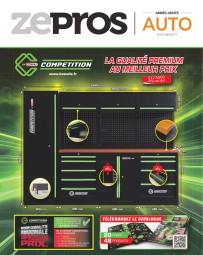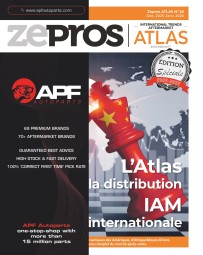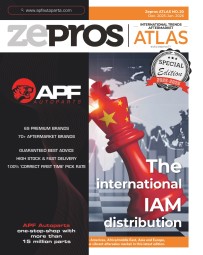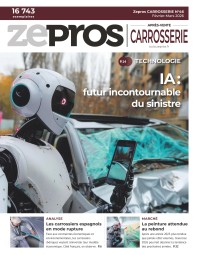
Gaël Escribe (Nexus): “Ride the digitization wave... or suffer the tsunami”

Nexus Automotive International is young. As a result, the ITG has spontaneously integrated digitalization since its creation in 2014. Digitization that is now an integral part of the aftermarket of today and the future. It is not surprising to see a company which has a turnover of €40Bn and 2,000 distribution points worldwide taking part in the emergence of the digital aftermarket hit that is the Indian start-up Ki Mobility. Valued at almost €1Bn after barely three years.
Every time you make an announcement you praise the driving force of digitalization in the significant development of the aftermarket. Why is that?
Gaël Escribe: I have always believed that digitization is at the heart of the transformation of our industry. It is therefore natural that we consider digitization as a major factor in innovation in the sector. Especially since investors who are interested in the aftermarket consider digital transformation and sustainable mobility as two essential parameters when assessing their choices in making investments in our sector, to fund start-ups or make acquisitions.
You often cite India and the TVS group as examples of digitization.
G.E.: TVS is an Indian car sales group with a turnover of around $3 Bn. As a member of our Nexus Automotive Inter- national group, the company wanted to enter the aftermarket. It was not present at all just four 4 years ago. To succeed, it made the strategic choice to invest from an exclusively digital angle. Through Mobilion, an investment fund co-created by Nexus, we therefore invested in this adventure.
TVS has created from scratch India’s first digital automotive platform, called Ki Mobility, which offers a complete digital journey. The customer can follow every stage of the maintenance and repair of their vehicle in real time. Ki Mobility offers the garage digital integration of its workshop and includes the parts distributor in this same system. This closes the loop so that the entire process is digitized, from the car entering the workshop to its return to the customer, including delivery of each part and every stage in the workshop. This complete digitization of the journey is a tremendous lever for customer loyalty.
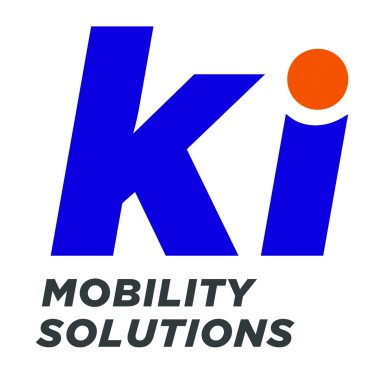
How is this Indian experience going?
G.E.: Ki Mobility was launched just three years ago, and by mid-2022 was already serving more than 2.5 million motorists, motorcyclists and transporters through 1,000 Indian garages, despite the covid crisis and the following economic crisis. Its managing director, G. Srinivasa Raghavan, anticipates very high growth in 2023, making it possible to expect more than $225 million in turnover for the year.
Just in India?
G.E.: Yes. And that’s just the beginning. TVS has just launched an application called “myTVS Life360”, a scalable application that already offers a complete maintenance path integrating an array of services including assistance, parts, insurance, payment, accessories, as well as a wide range of other mobility-related services. It has already expanded to used vehicle sales and rentals. And all this for a subscription fee of €57 over three years. On the scale of this country alone, it is an undeniable success in commercial and financial terms, since the valuation of Ki Mobility today is $935 million (€877 million). Ki Mobility will very quickly become a unicorn [Editor’s note: a start-up that reaches a valuation of €1 Bn] perhaps even the first of its kind in the aftermarket worldwide!
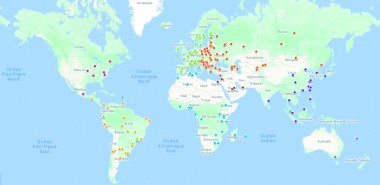
Do you think that this initiative is destined to spread throughout the world?
G.E.: Digitization is in essence “scalable”, so it can be deployed worldwide. Having been the only European on the board of directors of Ki Mobility for a long time, I can tell you that we think, and we react very quickly! Castrol India has announced an investment of up to €55 million in ki Mobility Solutions to create a common service and maintenance network. In addition, the company is no longer of interest only to Indian aftermarket players. Exor, the Agnelli family’s holding company in Italy, invested more than €50 million in it last August.
Do you think such an offer is inevitable?
G.E.: Yes, because it meets the new expectations of mobility users, by offering a transparent, simple, reliable, efficient and scalable response to their expectations. Yes, because it corresponds to the evolution of a market that we increasingly see as collaborative, by pragmatically interconnecting benefits and services coming from both OES as IAM and whose digital link translates into impressive efficiency in the real-world of the aftermarket.
When we see how quickly this solution has been adopted by the Indians, it is difficult to imagine a step backwards. In Western countries with more mature aftermarkets, this solution or other similar ones will prevail, perhaps more slowly, but they will inevitably create new benchmarks. Our belief at Nexus Automotive International is that there will be two categories of aftermarket player in the future: those who cleverly ride the wave of digitization, and those who, by ignoring it, will inevitably suffer its tsunami. Our role is to give the keys to our members, so that, everywhere in the world, they can be part of the first category.
Lire la version française : Gaël Escribe (Nexus) : «Prendre la vague de la digitalisation ou subir le tsunami»
